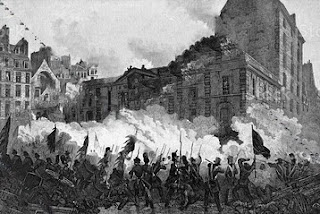Cardinal Newman's thought about the distinction between liberal and servile arts
OR
Bring out Cardinal Newman's idea of what university learning should consist of the reference to the "Knowledge Its Own End"
 |
| Cardinal Newman image from Wikipedia |
Newman begins his essay by posting how the idea of knowledge has often been considered to burdened with a purpose and places against it his own understanding on the issue knowledge, according to Newman: "capable of being its own end". Nevertheless, he admits the fact that it can lead to some ulterior achievements like wealth, power or honour, and even of a comfortable life but still Newman's objects here, in this essay is to show how it is productive by being a pursuit of itself and not in any ulterior productive by being a pursuit of itself and not in any ulterior productivity. Thus, however, reminds us of Bacon's dictum, — "Knowledge itself is power". Jaen Francois Lyotard also describes this more than a century later in his book The Post-Modern Condition, in which he analyses the position of knowledge in contemporary society:
knowledge ceases to be an end in itself, it loses it's use-value. [page no- 80]Thus what Newman writes is in line with the European tradition of Rationalism that had inception in the writings of Bacon and Descartes on the two sides of the English channel. Thus what Newman writes is in line with the European tradition of Rationalism that had inception in the writings of Bacon and Descartes on the two sides of the English channel.
In order to hammer home his point, Newman stresses man's instinctive desire for acquiring knowledge. Over here, he reflects the Victorian project of the self which ran hand in hand with the development projects of the time. And it is in this context that he points out the aspects in which such a non-utilitarian knowledge influences the human self. It enhances the quality of the values, manners and human behaviour. University knowledge is generally categorized into two types. Newman takes up these categories, those of Liberal Arts which are products of the intellect, "exercises of mind, of reason, of reflection" and the Servile Arts products of bodily skill only to subvert these categorizations and reach a greater personal end. In a manner that reminds us of Poststructural practices. Newman draws instances from different areas of knowledge like medicine, athletics, nobility and warfare to demonstrate how both intellect and physical skill are required in pursuit of these areas of knowledge. Thus, displacing the conventional categories of Liberal and Servile Arts he proceeds to his own definition of these polarities.
To Newman, Liberal Arts are not purpose oriented; they are self-content like games and entertainment and Servile Arts always burdened with a purpose like medical treatise and it is in the support of the definition that he refers to Aristotle and though he questions the way these arts are defined, he expresses his trust in the distinction of the two; for it is this distinction of the two; for it is this distinction that would distinguish university education from other sorts. University education, according to Newman "is then especially liberal, or sufficient for itself" (page no-81) and that is the height form of education. It is philosophical in its essence.




No comments
Thanks for your valuable opinion. Your comment inspires us a lot to do better time and again.